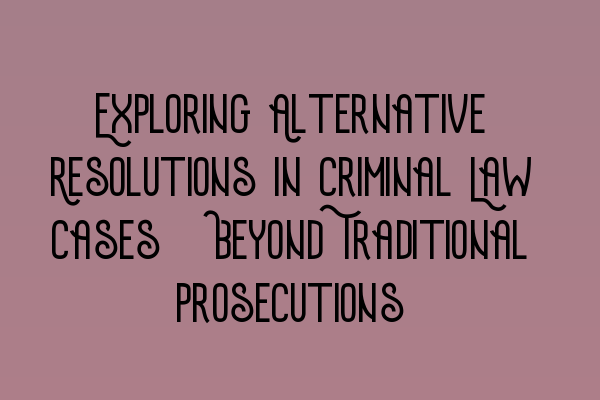Exploring Alternative Resolutions in Criminal Law Cases: Beyond Traditional Prosecutions
When it comes to criminal law cases, the traditional route has always been centered around prosecutions. However, in recent years, there has been a growing recognition of the benefits of exploring alternative resolutions. These alternative resolutions offer a range of possibilities that can be more effective in certain cases, providing advantages for both the accused and the criminal justice system as a whole.
The Need for Alternative Resolutions
In the criminal justice system, the primary goal has always been justice. Traditional prosecutions aim to hold individuals accountable for their actions and ensure that the punishment fits the crime. While this approach is essential in many cases, it is not always the most effective or efficient solution.
Alternative resolutions can provide a more tailored approach to justice, taking into account the unique circumstances of each case. These resolutions aim to address the underlying issues that may have contributed to the criminal behavior, with a focus on rehabilitation and preventing future offenses.
Types of Alternative Resolutions
There are several alternative resolutions that can be explored in criminal law cases:
- Diversion Programs: Diversion programs offer individuals an opportunity to avoid prosecution by participating in rehabilitative programs. These programs can address the root causes of criminal behavior, such as addiction or mental health issues, and provide individuals with the necessary tools to reintegrate into society.
- Restorative Justice: Restorative justice focuses on repairing the harm caused by the offense, rather than primarily punishing the offender. It involves bringing together the accused and the victim, along with other affected parties, to establish accountability and promote healing.
- Community Service: Community service can be an effective alternative resolution, particularly for non-violent offenses. Instead of being incarcerated, individuals can contribute to their community by volunteering their time and skills.
- Drug Courts: Drug courts specialize in cases involving substance abuse issues. These specialized courts provide treatment and support services to individuals struggling with addiction, with the goal of breaking the cycle of drug-related offenses.
- Deferred Prosecution Agreements (DPAs): DPAs are voluntary agreements between the accused and the prosecution, where the accused agrees to certain conditions and requirements to avoid prosecution. This can include fines, community service, or participation in rehabilitative programs.
The Benefits of Alternative Resolutions
Exploring alternative resolutions in criminal law cases can have numerous benefits:
- Reduced Prison Population: By diverting individuals away from traditional prosecutions, alternative resolutions can help alleviate the strain on the prison system, focusing resources on more serious offenses.
- Rehabilitation and Reintegration: Alternative resolutions prioritize rehabilitation and reintegration, addressing the underlying issues that contribute to criminal behavior. This can help reduce recidivism rates and promote long-term positive change.
- Restorative Justice: Restorative justice allows victims to have a voice in the process and facilitates their healing and closure. It also encourages offenders to take responsibility for their actions and make amends.
- Efficiency and Cost Savings: Alternative resolutions can be more time and cost-effective compared to traditional prosecutions, which often involve lengthy court proceedings.
Conclusion
As the criminal justice system continues to evolve, it is important to recognize the value of exploring alternative resolutions in criminal law cases. These resolutions offer a more holistic and individualized approach to justice, addressing the underlying causes of criminal behavior and promoting rehabilitation and reintegration. By considering alternative resolutions, we can move towards a more effective and efficient criminal justice system that focuses on preventing future offenses while still upholding the principles of justice.
For more information on criminal law and practice in the UK, please visit our related articles:
- SQE Exam Prep: Essential Study Materials for Aspiring Solicitors
- Demystifying the Solicitors Qualifying Examination Format
- SQE Exam for International Lawyers: Challenges and Success Strategies
- LLC Formation Made Simple: Step-by-Step Guide for UK Entrepreneurs
- LLC Formation: A Step-by-Step Guide for UK Entrepreneurs
